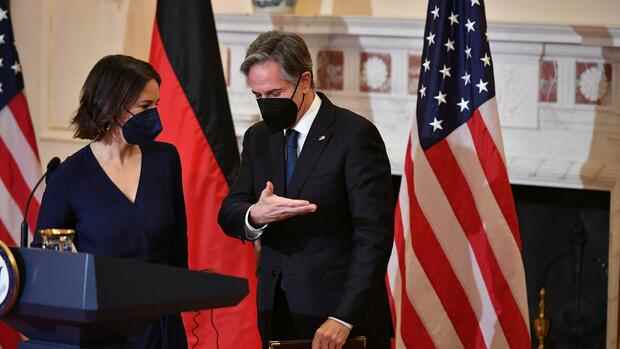The US Secretary of State makes his stance on the German-Russian pipeline clear.
(Photo: Reuters)
Washington Federal Foreign Minister Annalena Baerbock’s inaugural visit to Washington only lasts eight hours, but there is a lot for her to discuss in the short time. Immediately after landing in the US capital, she drove to the US State Department to meet her colleague Antony Blinken.
The focus was on Russia’s aggressive behavior in the Ukraine crisis. Both top politicians demonstrated solidarity with Russia.
But it quickly became clear that the transatlantic tensions were not resolved, particularly in the conflict over Nord Stream 2. Blinken proactively addressed the dispute over the German-Russian gas pipeline at a joint press conference. He showed that the US is keeping the pressure on Germany high. The fact is that no gas is currently flowing through Nord Stream 2, said Blinken. “And if Russia continues its aggression against Ukraine, it will certainly be very difficult to imagine that gas will flow through the pipeline in the future.”
Blinken thus formulated a kind of exit scenario for the eleven billion euro project to which the federal government is still officially sticking. Baerbock, on the other hand, remained vague when asked by a reporter. “It’s a very difficult situation,” she said. “We are working every hour, every minute to avoid an escalation,” she said, referring to Russia’s provocations against Ukraine.
Top jobs of the day
Find the best jobs now and
be notified by email.
She admitted that the coalition partners in Berlin had different ideas about how to deal with Nord Stream 2. But the different voices would end up describing “the same situation”, she emphasized.
The Green politician traveled to Washington for the first time as Federal Foreign Minister.
(Photo: Reuters)
Baerbock’s party, the Greens, are harsh critics of the pipeline, but Chancellor Olaf Scholz’s SPD is one of its biggest supporters. The gas pipeline was completed in September and is waiting for final certification by the Federal Network Agency.
In the summer, US President Joe Biden decided to suspend sanctions against Germany in connection with Nord Stream 2. The President and the then Chancellor Angela Merkel concluded an agreement that is intended to strengthen Ukraine’s energy independence. However, the agreement between the US and Germany left a lot of room for interpretation. Among other things, it says that Russia must fear “consequences” if it uses energy as a weapon.
These consequences, as the press conference with Baerbock and Biden suggested, are still not clearly defined.
It has been more than half a year since the agreement was signed in the summer, and Russia has built massive armaments on the Ukrainian eastern border. Should Russia actually invade Ukraine, American resistance to the pipeline would increase significantly. Then the federal government would hardly have an argument to keep the project going.
US President Biden has so far insisted on not wanting to sanction an important partner like Germany. But he is under immense political pressure. As early as next week, the US Senate could vote in Congress on possible new sanctions against Nord Stream 2, which should also affect Germany.
“Immediate Challenge”
For the moment, both sides are trying to ensure that the dispute does not interfere with joint efforts to develop a strategy for Russia. Blinken called the tense situation on the eastern border of Ukraine an “immediate and urgent challenge”. The conflict with Russia, which has around 100,000 soldiers stationed in the region, is “not just about Ukraine, but about international rules. A country cannot simply threaten another country’s border. We won’t allow that, ”said Blinken. Both Germany and the USA are “united and steadfast in their stance”.
Baerbock saw the solution to the Russian-Ukrainian crisis “in a decisive phase,” she stressed, just as the USA was keeping Germany’s door open to diplomacy.
Together with the European Union, the USA has prepared severe sanctions. However, despite a crisis phone call between US President Joe Biden and Russian President Vladimir Putin, Moscow has so far made little move to defuse the situation.
In 2014, Russia’s president had Crimea annexed.
(Photo: dpa)
It is also questionable whether threats of sanctions can even induce Putin to rethink. Existing sanctions have not changed the fact that Russia has been occupying Crimea in violation of international law since 2014. Most recently, Putin demanded that Ukraine should never join NATO and that the Western military alliance should stop all activities in Ukraine and Eastern Europe.
In the coming days, all mediation efforts will be ramped up: a Russian-American meeting is planned in Geneva on Monday. Talks will also take place next week within the Organization for Security and Cooperation in Europe (OSCE), followed by a Russia-NATO meeting on January 12 and a larger conference with Moscow, Washington and EU countries. The EU’s foreign affairs representative, Josep Borrell, also went on a three-day visit to Ukraine.
More: Biden wants to mediate in the Ukraine conflict – but Putin remains unpredictable
